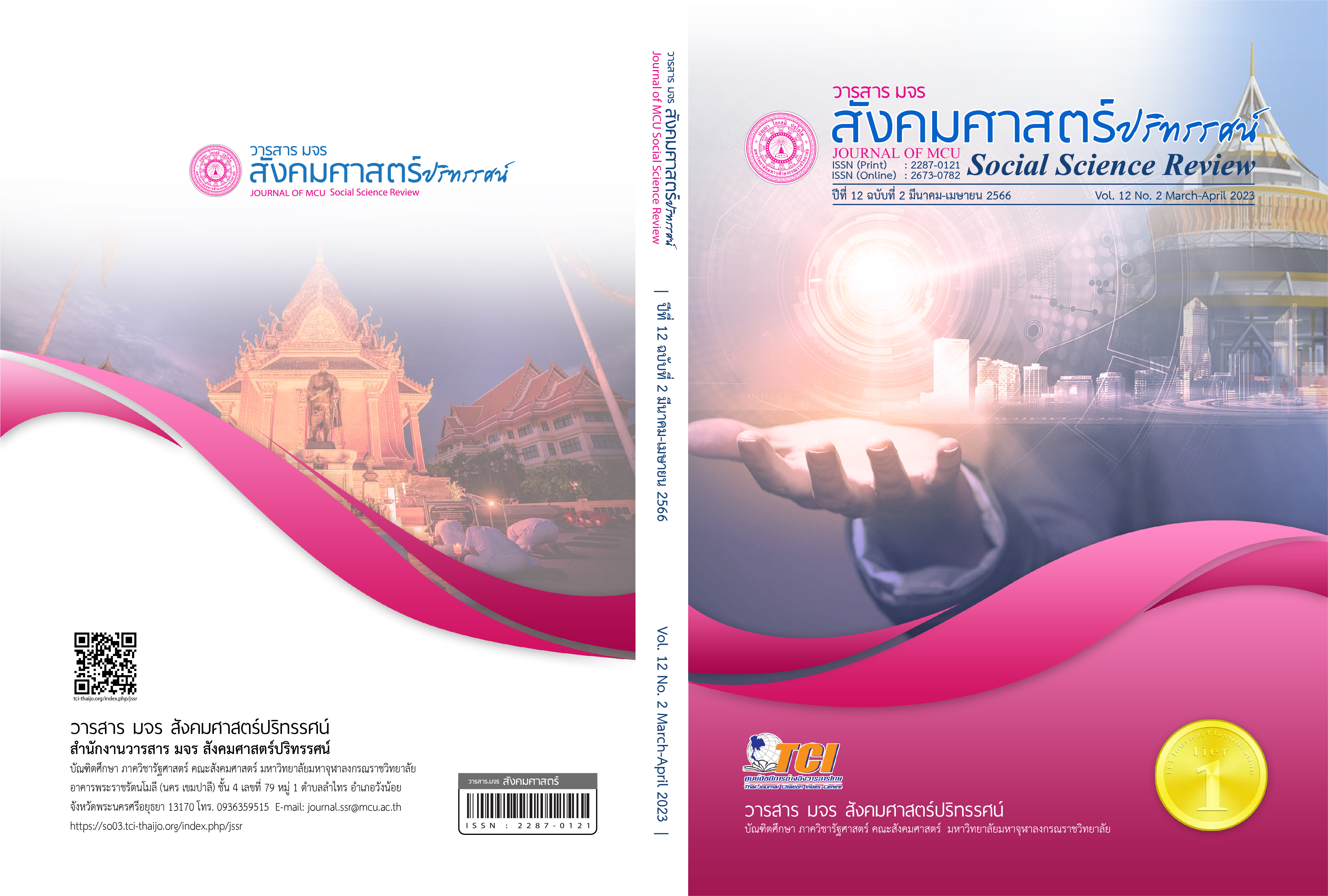บทบาทของภาคประชาสังคมในกระบวนการนโยบายสาธารณะ กับการจัดการการแพร่ระบาดของโรคโควิด-19
คำสำคัญ:
นโยบายสาธารณะเชิงวาทกรรม, นโยบายสาธารณะ, โรคโควิด-19บทคัดย่อ
การมีส่วนร่วมของประชาชนในการบริหารประเทศ คือหัวใจสำคัญของการปกครองในระบอบประชาธิปไตย และเป็นหน้าที่ของรัฐบาลที่ต้องเปิดโอกาสให้ประชาชนได้เข้ามามีส่วนร่วมในการกำหนดนโยบายและการบริหารประเทศให้มากที่สุดอย่างเหมาะสม ภาคประชาสังคมมีบทบาทในการกระตุ้นให้ประชาชนได้ตระหนักถึงแนวทางการมีส่วนร่วมในกระบวนการกำหนดและบริหารนโยบายสาธารณะที่ส่งผลต่อการพัฒนาประเทศและส่งผลต่อวิถีชีวิตของประชาชน รัฐบาลต้องดำเนินการบริหารงานและแก้ไขปัญหาในทุกด้านไปพร้อม ๆ กัน ทั้งการเมือง เศรษฐกิจ และสังคม อย่างเห็นพ้องต้องกันกับประชาชน ทั้งในภาวะปกติและไม่ปกติอย่างเช่นสถานการณ์โรคโควิด-19 การบริหารสถานการณ์แบบรวมศูนย์และใช้อำนาจบังคับในสถานการณ์ฉุกเฉินโดยขาดการมีส่วนร่วมจากภาคส่วนที่เกี่ยวข้อง ทำให้เกิดความไม่มีประสิทธิภาพ มีความล่าช้าและทำให้ขาดความเชื่อมั่นจากสังคม ทำให้ภาคประชาสังคมต้องเข้าช่วยเหลือและสงเคราะห์ผู้ที่ได้รับผลกระทบ หนทางที่เหมาะสมคือ การส่งเสริมการมีส่วนร่วมและการร่วมมือของภาคประชาสังคมกับรัฐในการบริหารสถานการณ์ที่ไม่ปกติจะช่วยผ่อนหนักให้เป็นเบาและลดข้อผิดพลาด
เอกสารอ้างอิง
คณะกรรมการกฤษฎีกา. (2553). พระราชบัญญัติบริหารราชการแผ่นดิน พ.ศ. 2534. สืบค้น 11 ตุลาคม 2564, จาก http://web.krisdika.go.th/ipads/data/
ธร ปีติดล. (2562). หลากคำถามเรื่องประชาสังคม (1) : ปัญหาของแนวคิด. The 101.World. สืบค้น 24 กันยายน 2564, จาก the101.world/arguments-of-civil-society-1/
______. (2562). หลากคำถามเรื่องประชาสังคม (2) : บทสะท้อนประสบการณ์ของประเทศไทย. The 101.World. สืบค้นวันที่ 4 ตุลาคม 2564, จาก the101.world/arguments
ธีรพัฒน์ อังศุชวาล. (2558). ประชาสังคม (Civil Society) ในมุมมองใหม่: บทสำรวจหน้าตาและตำแหน่งแห่งที่ของประชาสังคมในมุมมอง Civil Society Diamond. วารสารการเมืองการปกครอง วิทยาลัยการเมืองการปกครอง มหาวิทยาลัยมหาสารคาม, 5(1), 39–67.
นภารัตน์ กิตติรัตนมงคล. (2562). การจัดการตนเองของภาคประชาสังคมเพื่อการเข้าสู่เขตพัฒนาเศรษฐกิจพิเศษจังหวัดตาก (ดุษฎีนิพนธ์ปริญญาปรัชญาดุษฎีบัณฑิต สาขาวิชารัฐประศาสนศาสตร์ วิทยาลัยบริหารรัฐกิจ คณะรัฐศาสตร์). ปทุมธานี: มหาวิทยาลัยรังสิต.
ปธาน สุวรรณมงคล. (2564). เราเรียนรู้อะไรจากโควิด 19. ต้นฉบับร่างเอกสารบทความทางวิชาการ (รอการพิจารณาตีพิมพ์เผยแพร่).
พรทิพย์ แก้วมูลคำ. (2560). การบริหารราชการแบบมีส่วนร่วม: เทคนิควิธีและการนำไปสู่การปฏิบัติ. กรุงเทพฯ: มหาวิทยาลัยราชภัฏสวนสุนันทา.
วิกิพีเดีย สารานุกรมเสรี. (2561). ประชาสังคม. สืบค้น 24 กันยายน 2564, จาก https://th.wikipedia.org/wiki/
สถาบันพัฒนาประชาสังคม. (2559). แนวคิดเรื่องประชาสังคม. สืบค้น 24 กันยายน 2564, จาก https://www.csdi.or.th/
สำนักงานคณะกรรมการสุขภาพแห่งชาติ. (2564). ‘ภาคประชาสังคม’ สู้โควิด-19 พบทั้ง ‘ไทย-เทศ’ ต่างเชื่อมร้อยชุมชน. สืบค้น 21 กันยายน 2564 จาก, www.nationalhealth.or.th/
อำพล จินดาวัฒนะ. (2552). การสร้างนโยบายสาธารณะ เพื่อสุขภาพแบบมีส่วนร่วม: มิติใหม่ของการเสริมสร้างสุขภาพ. นนทบุรี: บริษัท บิยอนด์ พลับลิสชิ่ง จำกัด.
เอนก เหล่าธรรมทัศน์. (2541). ส่วนร่วมที่มิใช่รัฐ : ความหมายของประชาสังคม. วารสารธรรมศาสตร์, 24(2), 124-151
ADB สำนักงานผู้แทนประจำประเทศไทย. (2554). รายงานเรื่อง ภาคประชาสังคมในประเทศไทยโดยสังเขป. กรุงเทพฯ: สำนักงานผู้แทนประจำประเทศไทย.
Parvin, Phil. (2018). Democracy without Participation: A New Politics for Disengaged Era. Res Publica, 24, 31–52.
ดาวน์โหลด
เผยแพร่แล้ว
รูปแบบการอ้างอิง
ฉบับ
ประเภทบทความ
สัญญาอนุญาต
ลิขสิทธิ์ (c) 2023 วารสาร มจร สังคมศาสตร์ปริทรรศน์

อนุญาตภายใต้เงื่อนไข Creative Commons Attribution-NonCommercial-NoDerivatives 4.0 International License.
เพื่อให้เป็นไปตามกฎหมายลิขสิทธิ์ ผู้นิพนธ์ทุกท่านต้องลงลายมือชื่อในแบบฟอร์มใบมอบลิขสิทธิ์บทความให้แก่วารสารฯ พร้อมกับบทความต้นฉบับที่ได้แก้ไขครั้งสุดท้าย นอกจากนี้ ผู้นิพนธ์ทุกท่านต้องยืนยันว่าบทความต้นฉบับที่ส่งมาตีพิมพ์นั้น ได้ส่งมาตีพิมพ์เฉพาะในวารสาร มจร สังคมศาสตร์ปริทรรศน์ เพียงแห่งเดียวเท่านั้น หากมีการใช้ภาพหรือตารางหรือเนื้อหาอื่นๆ ของผู้นิพนธ์อื่นที่ปรากฏในสิ่งตีพิมพ์อื่นมาแล้ว ผู้นิพนธ์ต้องขออนุญาตเจ้าของลิขสิทธิ์ก่อน พร้อมทั้งแสดงหนังสือที่ได้รับการยินยอมต่อบรรณาธิการ ก่อนที่บทความจะได้รับการตีพิมพ์ หากไม่เป็นไปตามข้อกำหนดเบื้องต้น ทางวารสารจะถอดบทความของท่านออกโดยไม่มีข้อยกเว้นใดๆ ทั้งสิ้น





